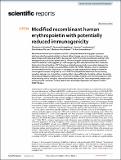Modified recombinant human erythropoietin with potentially reduced immunogenicity
Author(s)
Susantad, Thanutsorn; Fuangthong, Mayuree; Tharakaraman, Kannan; Tit-oon, Phanthakarn; Ruchirawat, Mathuros; Sasisekharan, Ram; ... Show more Show less
DownloadPublished version (1.628Mb)
Publisher with Creative Commons License
Publisher with Creative Commons License
Creative Commons Attribution
Terms of use
Metadata
Show full item recordAbstract
© 2021, The Author(s). Recombinant human erythropoietin (rHuEPO) is a biopharmaceutical drug given to patients who have a low hemoglobin related to chronic kidney disease, cancer or anemia. However, some patients repeatedly receiving rHuEPO develop anti-rHuEPO neutralizing antibodies leading to the development of pure red cell aplasia (PRCA). The immunogenic antibody response activated by rHuEPO is believed to be triggered by T-cells recognizing EPO epitopes bound to MHC molecules displayed on the cell surface of APCs. Previous studies have reported an association between the development of anti-rHuEpo-associated PRCA and the HLA-DRB1*09 gene, which is reported to be entrenched in the Thai population. In this study, we used computational design to screen for immunogenic hotspots recognized by HLA-DRB1*09, and predicted seventeen mutants having anywhere between one through four mutations that reduce affinity for the allele, without disrupting the structural integrity and bioactivity. Five out of seventeen mutants were less immunogenic in vitro while retaining similar or slightly reduced bioactivity than rHuEPO. These engineered proteins could be the potential candidates to treat patients who are rHuEpo-dependent and express the HLA-DRB1*09 allele.
Date issued
2021-01Department
Koch Institute for Integrative Cancer Research at MIT; Massachusetts Institute of Technology. Department of Biological EngineeringJournal
Scientific Reports
Publisher
Springer Science and Business Media LLC
ISSN
2045-2322